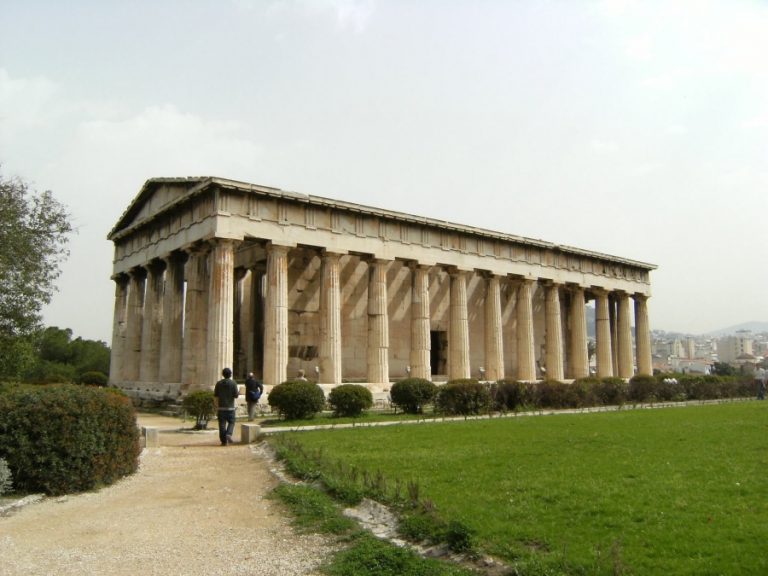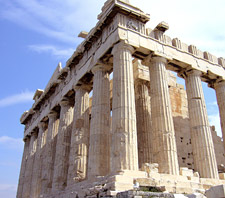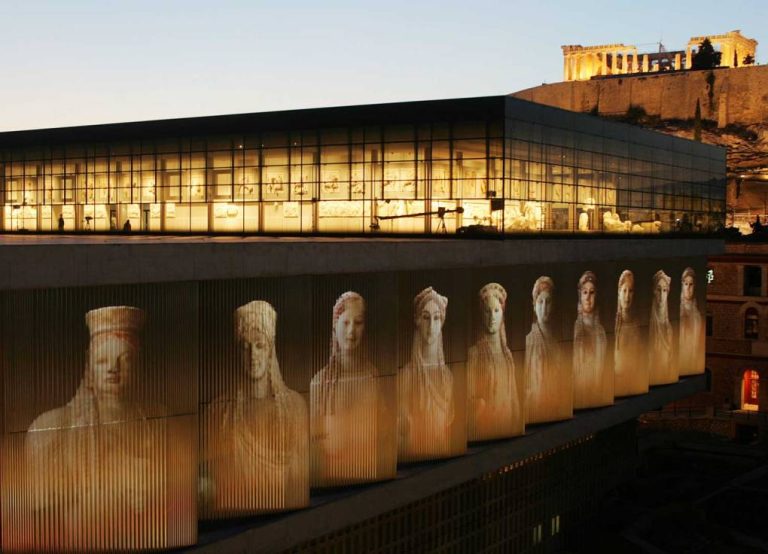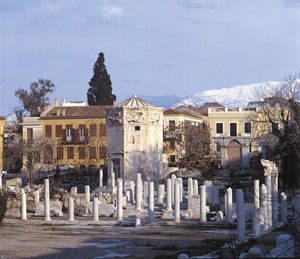History of Athens
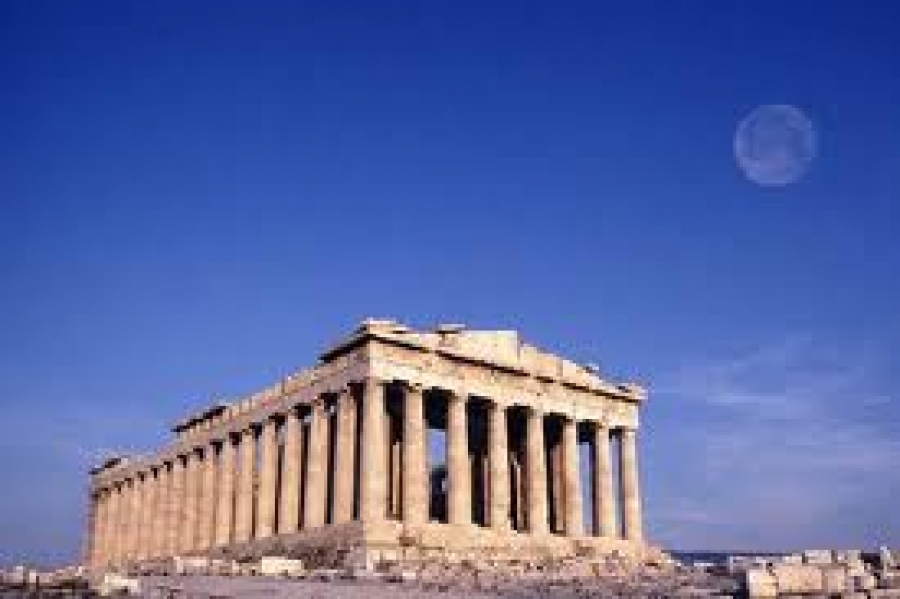
A Brief Reference to the History of Athens
Athens was named according to the Greek mythology from competition that the goddess Athena had with Poseidon about who will become protector of the city. The myth says that Poseidon gave a spring with sea water whilst Athena offered an olive tree as she touched the ground of the sacred rock of the Acropolis. The people of Athens choose Athena as their protector and so the city was named after the goddess of wisdom. The myth is symbolic but the two Gods symbolising the strength of Athens as a city of wisdom and as a sea power. The first settlement of Athens 3000 BC was situated on the rock of Acropolis.
According to the tradition, Athens was founded, when the king Theseus united in a state several settlements of Attica. The last king of ancient Athens was Kodros, who sacrificed his life in order to save the homeland. Later came to power the nobles (wealthy landowners). The nobles ruled Athens by their consul the Supreme Court (Arios Pagos), from this consul where elected the 9 rulers of Athens . During this time was existed the assembly of the Athenian citizens (Ecclesia of Demos) but during this period did’t had the power that had later with the lows of Solon.
After the the period of colonisation and expansion of trade, many citizens of Athens became rich and wealthy from the trade and shipping, and they wished to participate in the administration of the state, while from the other hand the lower classes of the city where facing poverty. This fact resulted riots between the poor who wanted land and new lows with more social justice and the nobles that wanted to keep their power and authority.
Those riots tried to exploit the ambitious Kylon aiming to become a tyrant, but he failed. His movement stayed in history as ‘Kylonion Agos’. After this , the nobles tasked Drakon to write new laws in response to peoples demand. But the laws o fDracon were too hard and peremptory and thus disappointed the Athenians.
As the laws of Dracon did not meet the expectations of the people of Athens who they tasked Solon, which was considered as a very wise man, to write new laws.
Solon gave back the debts of the citizens and let free all those who had been slaves from their debts. That law, because released the people of Athens from a very heavy burden, was named ‘seisachtheia’
Solon split the Athenians into four classes, depending on their income. Archons (rulers) had the right to become only the rich. But, Solon strengthened politically and the poor, because he gave the great strength to the Ecclesia of Demos, namely, the assembly of citizens. The assembly decided on all major issues and was voting the laws which were prepared by the House of the four hundred. Solon founded the large peoples court, the Iliaia. Those where the first steps towards democracy.
But even the laws of Solon reassured the Athenians. The poor wanted reframing, namely re-division of the land. During this period the nobility lost much of their old power and Peisistratos managed to gain the support of many people and become a tyrant.
Peisistratos supported the farmers and produced numerous projects in Athens. His sons and successors, however, Hippias and Hipparchos , were hard to the Athenians and had no happy ending. Hippias escaped to Persia, where he died in exile and Hipparchos was killed by the Athenians.
With the end of the Tyranny, the Athenians start to organize democracy. The main creator was Kleisthenes, who radically reformed the constitution. Kleisthenes divided the Athenians in 10 races with ten municipalities each. In each race belong citizens from various areas of Attica and thus the rich ceased to be a noble themselves and a strong class as they mixed with other fellow citizens.
Kleisthenes gave all the power at the Ecclesia of Demos. From that assembly were elected the 10 generals who governed not only the military, but the state itself. The parliament of 400 of Solon was replaced by a new parliament with 500 deputies. The members of the new parliament where 50 Athenians from each race, selected annually by draw. With this system all the citizens of Athens were likely to be some day members of the parliament. The task of the parliament was to prepare the topics to be discussed by the Ecclesia of Demos.
Kleisthenes in order to secure the new constitution, introduced the ostracism. Every citizen was writing on a piece of broken vase (shell) the name of a politician who could have been dangerous for the democracy, after that they where counting the oysters and where sending to exile for 10 years the ones who had gathered 6 thousand shells with their name.
Thus was born in Athens, the democracy, the constitution that gives all citizens the right and duty to participate in the governance of the state. Democracy was one of the most significant achievements of the ancient Greeks.
Athens lived its most glorious times during the 5th century BC under the reign of Pericles. During this period the Golden Age of Athens Parthenon was build. Arts , Philosophy, Drama, developed to their highest point. Unfortunately the Peloponnesian war between the Athenians and Sparta gave an end to this glory.
But Athens continued to be a centre of culture and intellectual importance even during the Roman times. On his journeys to Greece St Paul spoke to the Athenians from the rock of Arios Pagos (Areopagos) in 44 AD . During the reign of the Roman Emperor Hadrian , Athens became his beloved city. Hadrian build and decorated Athens with magnificent monuments like the Hadrian’s Library. He use to say ‘to the south of Acropolis is Theseus Athens and to the north of Acropolis is Hadrian’s Athens’.
With the fall of the Roman Empire declined Athens importance as well. During the Byzantine times Athens was a provincial town of the Byzantine Empire. But even during this times many Byzantine churches where build in Athens. The Crusaders invaded the city in the 13th century until the 15th century when the city was occupied by the Turks. After the Greek war of Independence Athens became the Capital of Greece in 1833. Under the reign of the first king of Greece, Otto the city extended to the north and many buildings where build from German and Greek Architects.

